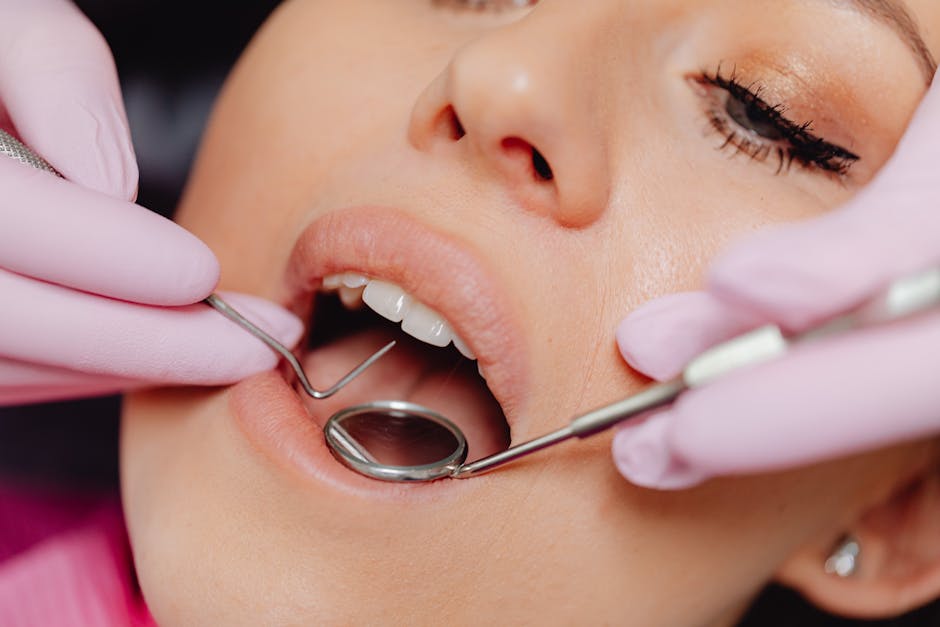Regular visits to the dentist are more than just a routine; they are a crucial part of maintaining your overall health. The significance of these visits extends beyond a clean and healthy smile. They can also help detect early signs of serious health issues, prevent the progression of oral diseases, and even contribute to your overall well-being. So, why should you keep reading? Because understanding the importance of regular dental visits can potentially save you from unnecessary pain, expensive treatments, and serious health complications.
Key Takeaways
- Regular dental visits are essential for early detection of dental issues.
- Professional cleaning during dental visits can prevent tooth decay and gum disease.
- Dental visits play a significant role in preventive dentistry.
- Regular dental check-ups can help detect non-dental health issues.
- Understanding the frequency and cost of dental visits can help manage dental health expenses.
The Importance of Regular Dental Visits for Oral Health
Early Detection of Dental Issues
Identification of cavities, gum disease, and oral cancer
Regular dental visits allow for the early detection of dental issues such as cavities, gum disease, and even oral cancer. Dentists are trained to identify these problems in their early stages, making treatment more effective and less invasive.
Prevention of disease progression
By catching dental issues early, dentists can prevent the progression of diseases that could potentially lead to tooth loss or more serious health complications. Regular check-ups are your first line of defense against oral diseases.
Professional Cleaning
Removal of plaque and tartar
Professional cleaning during a dental visit involves the removal of plaque and tartar that regular brushing and flossing at home can’t reach. This helps prevent tooth decay and gum disease.
Prevention of tooth decay and gum disease
By removing plaque and tartar, dentists can prevent the onset of tooth decay and gum disease, both of which can lead to pain, tooth loss, and other health problems if left untreated.

The Role of Dental Visits in Preventive Dentistry
Comprehensive Examinations
Assessment of teeth and gum health
During a dental visit, the dentist conducts a comprehensive examination of your teeth and gums. This assessment helps detect any potential issues and evaluate the overall health of your mouth.
Evaluation of need for treatments like fillings or root canals
Based on the comprehensive examination, the dentist can evaluate if there is a need for treatments like fillings or root canals. This proactive approach can save you from future pain and complications.
Education on Proper Dental Hygiene
Instructions on brushing and flossing techniques
Dentists also provide education on proper dental hygiene during your visit. They can instruct you on the correct brushing and flossing techniques to maintain your oral health.
Recommendations for oral care products
Dentists can recommend oral care products that are best suited for your specific needs. This personalized advice can enhance your daily oral hygiene routine.

The Connection Between Oral Health and Overall Well-being
Detection of Non-dental Health Issues
Signs of nutritional deficiencies, infections, and systemic diseases
Regular dental visits can also help detect non-dental health issues. Signs of nutritional deficiencies, infections, and systemic diseases like diabetes can often be spotted in the mouth during a dental examination.
Impact on Physical Health
Link between gum disease and heart disease, diabetes, and pregnancy complications
There is a proven link between gum disease and other health conditions such as heart disease, diabetes, and complications during pregnancy. Regular dental visits can help manage these risks and contribute to your overall well-being.

What to Expect During a Dental Visit
Review of Overall Health
Discussion of health changes and medication use
During a dental visit, the dentist will review your overall health. This includes discussing any health changes and medication use, as these can affect your oral health.
Professional Teeth Cleaning
Scaling to remove plaque and tartar
Professional teeth cleaning involves scaling, a process that removes plaque and tartar from your teeth. This is an essential step in preventing tooth decay and gum disease.
Polishing to remove stains and smooth the enamel
After scaling, the dentist will polish your teeth to remove stains and smooth the enamel. This leaves your teeth clean and shiny.
Thorough Dental Exam
Inspection of teeth, gums, and mouth for signs of disease
The dentist will conduct a thorough dental exam, inspecting your teeth, gums, and mouth for signs of disease. This includes checking for cavities, gum disease, and oral cancer.
X-rays to diagnose hidden problems
X-rays may be taken to diagnose hidden problems that can’t be seen during a visual examination. This helps ensure that any issues are detected and treated early.
Understanding the Frequency and Cost of Dental Visits
Recommended Visit Frequency
General guideline of every six months for checkups and cleaning
The general guideline is to visit the dentist every six months for checkups and cleaning. However, the frequency may vary based on your individual oral health needs.
Customized schedules based on individual oral health needs
Your dentist can provide a customized schedule based on your individual oral health needs. This personalized approach ensures that you receive the right care at the right time.
Managing Dental Health Expenses
Navigating costs with or without insurance
Understanding the cost of dental visits can help you navigate expenses with or without insurance. Regular dental visits are an investment in your health and can save you money in the long run by preventing costly treatments.
Planning for out-of-pocket expenses for comprehensive care
Planning for out-of-pocket expenses for comprehensive care is an important part of managing your dental health expenses. Regular dental visits can help prevent major dental issues that can lead to expensive treatments.
Regular dental visits are not just about maintaining a beautiful smile; they are a crucial aspect of your preventive healthcare. By understanding the significance of these visits, you can take proactive steps towards maintaining your oral health and overall well-being. So, when was your last dental visit? (source: The Importance of Regular Dental Visits)
Smile Brighter: Your FAQ Guide to the Importance of Regular Dental Check-Ups
Why are regular visits to the dentist important?
Regular visits to the dentist are crucial for maintaining oral health. They allow for early detection of potential issues such as cavities, gum disease, and even oral cancer. Early detection means easier and less costly treatments. Moreover, professional cleanings remove plaque and tartar buildup that regular brushing and flossing can’t, preventing tooth decay and gum disease.
How often should I visit the dentist?
It is generally recommended to visit the dentist every six months for a check-up and cleaning. However, your dentist may suggest a different frequency based on your individual oral health needs. Some people with specific dental issues or a higher risk of dental disease might need to go more often.
What happens during a routine dental check-up?
During a routine check-up, your dentist will examine your teeth, gums, and mouth for any signs of decay, gum disease, or other oral health issues. They may also perform a professional cleaning to remove plaque and tartar. X-rays might be taken to detect problems not visible to the naked eye. The visit is also an opportunity to discuss any concerns or questions you have about your oral health.
Can regular dental visits prevent bad breath?
Yes, regular dental visits can help prevent bad breath. Bad breath is often caused by bacteria buildup, gum disease, or leftover food particles. Professional cleanings remove plaque and tartar, reducing the bacteria in your mouth and, consequently, bad breath. Your dentist can also identify and treat gum disease or other conditions that might be causing bad breath.
Are dental check-ups necessary if I have no natural teeth?
Yes, dental check-ups are still necessary even if you have no natural teeth. For individuals with dentures or implants, these visits are crucial for ensuring the proper fit and function of their dental appliances. Additionally, your dentist will examine your gums, tongue, and the rest of your mouth for any signs of disease or other issues.
Can a dentist detect health issues outside of oral health during a check-up?
Yes, dentists can often detect signs of systemic health issues during a dental check-up. Conditions like diabetes, vitamin deficiencies, and even some cancers can manifest symptoms in the mouth. While dentists cannot diagnose these conditions, they can recommend you see your primary care physician for further evaluation.
Is there a link between oral health and overall health?
Absolutely, there is a significant link between oral health and overall health. Poor oral health has been associated with various systemic diseases, including heart disease, stroke, and diabetes. Infections in the mouth can enter the bloodstream and affect other parts of the body. Maintaining good oral hygiene and regular dental visits can help protect your overall health.
What can I do between dental visits to maintain oral health?
Between dental visits, it’s important to maintain good oral hygiene by brushing your teeth twice a day with fluoride toothpaste, flossing daily, and using mouthwash. Avoiding tobacco products, limiting sugary foods and drinks, and eating a balanced diet also contribute to good oral health. If you notice any changes in your oral health, contact your dentist.



